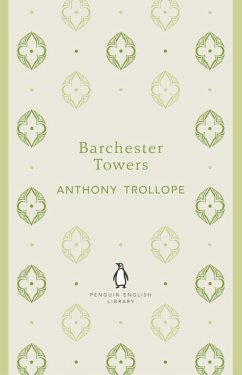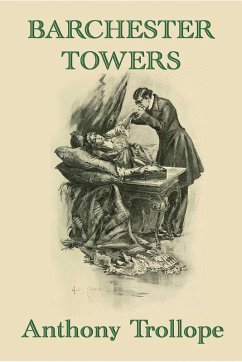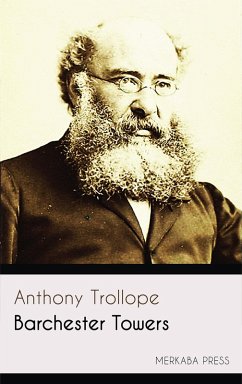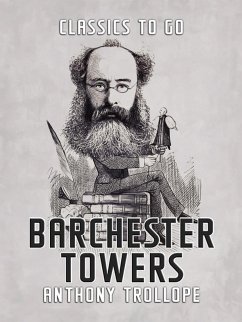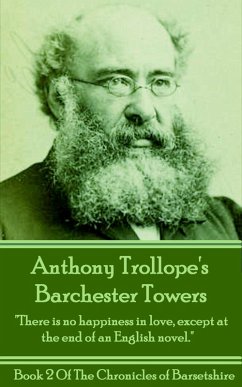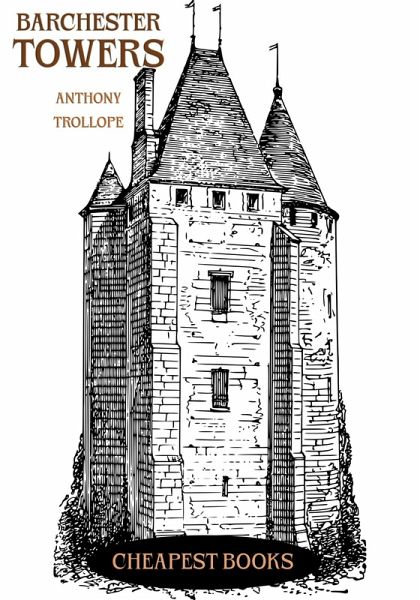
Barchester Towers (eBook, ePUB)
Versandkostenfrei!
Sofort per Download lieferbar
Statt: 32,99 €**
3,99 €
inkl. MwSt. und vom Verlag festgesetzt.
**Preis der gedruckten Ausgabe (Broschiertes Buch)
Alle Infos zum eBook verschenkenWeitere Ausgaben:

PAYBACK Punkte
0 °P sammeln!
Barchester Towers concerns the leading clergy of the cathedral city of Barchester. The much loved bishop having died, all expectations are that his son, Archdeacon Grantly, will succeed him. Owing to the passage of the power of patronage to a new Prime Minister, a newcomer, the far more Evangelical Bishop Proudie, gains the see. His wife, Mrs. Proudie, exercises an undue influence over the new bishop, making herself as well as the bishop unpopular with most of the clergy of the diocese. Her interference to veto the reappointment of the universally popular Mr. Septimus Harding (Protagonist of T...
Barchester Towers concerns the leading clergy of the cathedral city of Barchester. The much loved bishop having died, all expectations are that his son, Archdeacon Grantly, will succeed him. Owing to the passage of the power of patronage to a new Prime Minister, a newcomer, the far more Evangelical Bishop Proudie, gains the see. His wife, Mrs. Proudie, exercises an undue influence over the new bishop, making herself as well as the bishop unpopular with most of the clergy of the diocese. Her interference to veto the reappointment of the universally popular Mr. Septimus Harding (Protagonist of Trollope's earlier novel, The Warden) as warden of Hiram's Hospital is not well received, even though she gives the position to a needy clergyman, Mr Quiverful, with 14 children to support.
Even less popular than Mrs. Proudie is the bishop's new chaplain, the hypocritical and sycophantic Mr. Obadiah Slope, who decides it would be expedient to marry Harding's wealthy widowed daughter, Eleanor Bold. Slope hopes to win her favour by interfering in the controversy over the wardenship. The Bishop or rather Mr. Slope under the orders of Mrs. Proudie, also orders the return of the prebendary Dr. Vesey Stanhope from Italy. Stanhope has been in Italy recovering from a sore throat for 12 years and has spent his time catching butterflies. With him to the Cathedral Close come his wife and their three adult children. The younger of Dr. Stanhope's two daughters causes consternation in the Palace and threatens the plans of Mr. Slope. Signora Madeline Vesey Neroni is a disabled serial flirt with a young daughter and a mysterious Italian husband, whom she has left. Mrs Proudie is appalled and considers her an unsafe influence on her daughters, servants and Mr. Slope. Mr. Slope is drawn like a moth to a flame and cannot keep away. Dr. Stanhope's son Bertie is skilled at spending money but not at making it; his sisters think marriage to rich Eleanor Bold will help.
The Old Dean of the Cathedral having died, Mr. Slope campaigns to become Dean but Mr. Harding is offered the preferment, with a beautiful house in the Close and fifteen acres of garden. Mr. Harding considers himself unsuitable and with the help of the archdeacon, arranges that Mr. Arabin be made Dean. With the Stanhopes' return to Italy, life in the Cathedral Close returns to normal and Mr. Harding continues his life of gentleness and music.
Even less popular than Mrs. Proudie is the bishop's new chaplain, the hypocritical and sycophantic Mr. Obadiah Slope, who decides it would be expedient to marry Harding's wealthy widowed daughter, Eleanor Bold. Slope hopes to win her favour by interfering in the controversy over the wardenship. The Bishop or rather Mr. Slope under the orders of Mrs. Proudie, also orders the return of the prebendary Dr. Vesey Stanhope from Italy. Stanhope has been in Italy recovering from a sore throat for 12 years and has spent his time catching butterflies. With him to the Cathedral Close come his wife and their three adult children. The younger of Dr. Stanhope's two daughters causes consternation in the Palace and threatens the plans of Mr. Slope. Signora Madeline Vesey Neroni is a disabled serial flirt with a young daughter and a mysterious Italian husband, whom she has left. Mrs Proudie is appalled and considers her an unsafe influence on her daughters, servants and Mr. Slope. Mr. Slope is drawn like a moth to a flame and cannot keep away. Dr. Stanhope's son Bertie is skilled at spending money but not at making it; his sisters think marriage to rich Eleanor Bold will help.
The Old Dean of the Cathedral having died, Mr. Slope campaigns to become Dean but Mr. Harding is offered the preferment, with a beautiful house in the Close and fifteen acres of garden. Mr. Harding considers himself unsuitable and with the help of the archdeacon, arranges that Mr. Arabin be made Dean. With the Stanhopes' return to Italy, life in the Cathedral Close returns to normal and Mr. Harding continues his life of gentleness and music.
Dieser Download kann aus rechtlichen Gründen nur mit Rechnungsadresse in A, B, BG, CY, CZ, D, DK, EW, E, FIN, F, GR, H, IRL, I, LT, L, LR, M, NL, PL, P, R, S, SLO, SK ausgeliefert werden.




